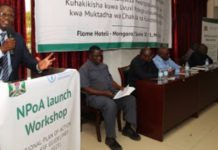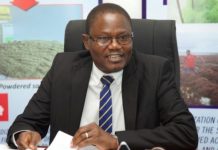AfricaPress-Tanzania: THE Centre for Behavioral Studies (CBS) and Environment for Development (EfD-Tanzania) teamed up over the weekend to equip officials with behavioural science knowledge to sharpen and boost their skills and capacity in policy making processes.
The officials who benefited from the training that was carried out by the two institutions which are both hosted at the Department of Economics at the University of Dar es Salaam came from the government, agencies and community-based organisations.
The training that was held in Morogoro under the theme ‘Behaviour Centered Environmental Initiatives for Sustainable Development in Tanzania’ aimed at sensitising participants on the urgent call for innovative approaches that take into account environmental considerations when formulating policies.
Speaking during the two-day workshop, Permanent Secretary in the Ministry of Livestock and Fisheries, Dr Rashid Tamatamah said the training came at the right time.
“This workshop is held at the time when there is great realisation that the country’s economy is highly depending on proper utilisation of natural resources and effective public policies for its prosperity and growth,” Dr Tamatamah said.
He added: “Once you equip behavioral science knowledge to government officials, it will help them during policy making processes, especially on environmental conservation and proper utilisation of natural resources, with a particular focus of Blue Economy.”
According to Dr Tamatamah, a key challenge that faces governments around the world is to improve the effectiveness of public policies processes across a range of domains.
He hailed the choice of the workshop’s theme: ‘Behaviour Centered Environmental Initiatives for Sustainable Development in Tanzania, saying it touched on critical areas of the economy.
Given the fisheries docket at the Ministry under which Dr Tamatamah is serving, he reminded participants that the theme responded to Sustainable Development Goals (SDGs), especially SDG14, which is about life under water, and pledged to conserve and sustainably use the oceans, seas and marine resources for sustainable development by 2030.
“The ocean ecosystem which includes the open ocean; coastal; marine inlets and transitional waters is a great contributor to the GDP and Tanzania livelihoods,” he said.
He said about a quarter of the Gross Domestic Product (GDP)’s contribution of 1.71 per cent from the fisheries sector in 2019 was realised from marine waters.
He added that whereas nationwide fisheries sector contributed 30 per cent of the animal protein intake, in some coastal districts of Tanzania mainland, that figure remains as high as 70 per cent.
He however warned that despite all the benefits coming from the oceans, the ecosystem is rapidly deteriorating mainly due to climate change, environmental degradation, over exploitation of resources and pollution.
“This calls for innovative approaches and policies that ensures environmental considerations are put in place and adhered to,” Dr Tamatamah emphasized.
“The workshop’s theme also matches with the country’s second National Five-Year Development Plan (FYDP II) 2016/17 2020/21 which is implemented under the theme: ‘Nurturing Industrialisation for economic Transformation and Human Development’ as it addresses the global challenges we face today, including poverty, inequality, climate change, environmental degradation, peace and justice,” he added.
On his side, the Principal of the College of Social Science (CoSS) of the University of Dar es salaam, Prof Razack Lokina said it is now increasingly recognised that behavioral science has a crucial role to play in achieving development milestones.
“We are here to equip participants through this workshop on how behavioral centered interventions can help in public policies,” said Prof Lokina.
Elaborating about CBS roles on behavioral changes, Prof Lokina said the centre deals with research, training and dissemination of studies that applies behavioral science approaches to address practical challenges facing Tanzania and Africa at large and provide evidence-based solutions.
He said Environment for Development initiative -Tanzania (EfDT)’s main goal is to support poverty alleviation and sustainable development through increased use of environmental economics capacity in policy making processes.





